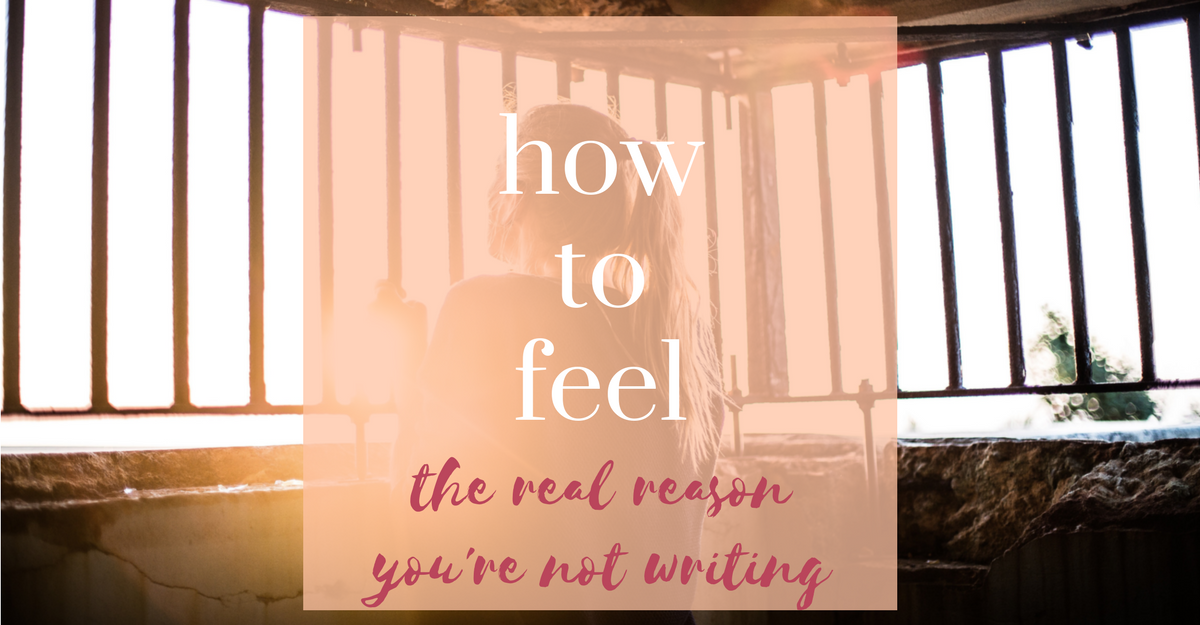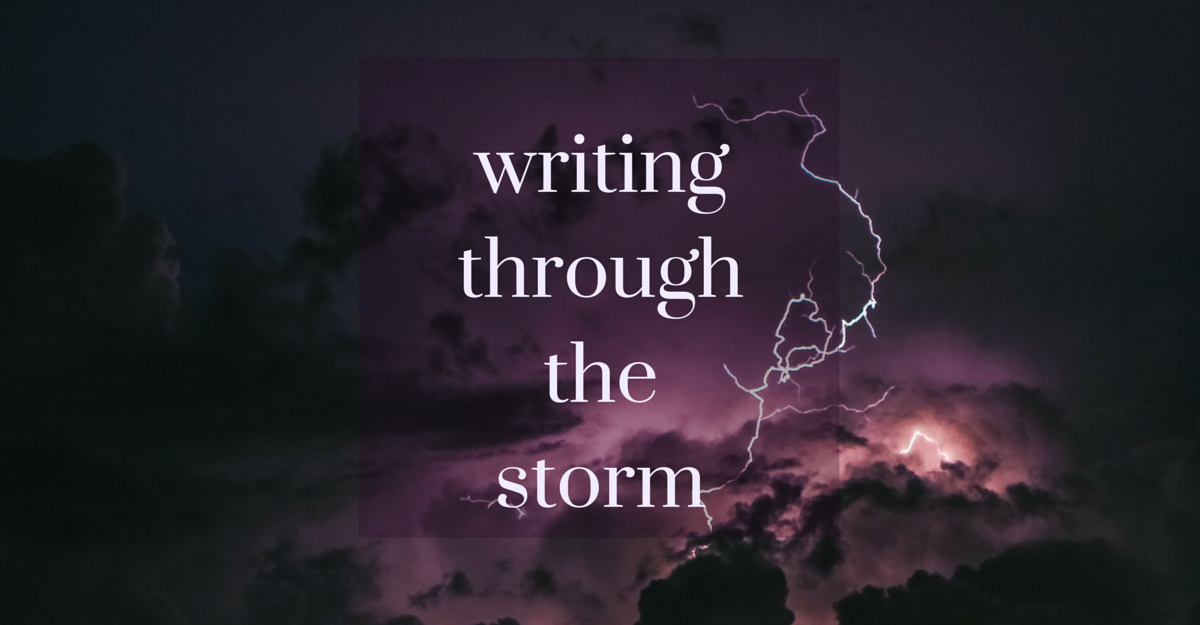Writing through the storm
/Always wanted to write? This one’s for you.
“I always wanted to be a writer.”
People tell me this all the time—scientists, lawyers, yoga teachers. Writing is a precious, painful, secret dream for them. They talk about it in low voices, their gaze slipping to a corner of the room.
They talk about it the way you’d talk about the one who got away, the person you still love even though it’s been ages, even though you probably shouldn’t.
“I always thought I’d write a book.”
But life gets in the way. But you don’t think you can. But your father’s sick or money’s tight or your job sucks the life out of you.
It’s cruel: the times when it’s most difficult to write—when life is hard and your creative spark dims and your self-esteem is getting ripped out by the roots—are precisely when you need most to write.
This post is going to be less eloquent than my others, less tidy. Maybe because I believe in it so fiercely.
All right, friends, here it is: if you always thought you’d write, it’s probably because you need to write. Not because you have some incredible locked-up gift you need to share with the world, although that might be the case, but because you need to write in order to process whatever it is you’re going through. Some people pray or meditate or run or bake cookies to make sense of their difficulties. You, though—you may need to write.
Let’s back up a bit. One year, to be precise.
A year ago, I was getting used to life without my dad. No, not getting used to. Some part of me will always believe he’s still out there, swimming laps in a pool or tapping so, so slowly at his office keyboard, picking out the right keys one by one with his pointer fingers. My mom and I still speak about him in the present tense—not because we mean to, but because it just comes out that way.
A year ago, though, I was acclimating to the reality that my dad wasn’t getting better, that in fact he’d died, and I wouldn’t see him again. He’d never pick up the phone again when I called the house, or squabble with my mom over who was going to finish the last bit of dinner out of the pan. (The answer was him, always.)
I thought this meant I was processing my grief pretty darn well. So I rolled up my sleeves at work, so I started planning my wedding.
(We all know how that one ended.)
Something was wrong, though. I struggled with my writing. I couldn’t bear to open the Word document that contained my novel, let alone make any progress on it.
I brought this up with my therapist.
“But you’ve been through so much,” she said. “It’s natural that you’re having difficulty with your writing. You shouldn't be so hard on yourself.”
This was good, reasonable advice. I wanted to go easier on myself, but I couldn’t. I hated myself for not writing, for not making progress on something that mattered to me so deeply. And soon enough this sentiment hardened into a kernel of self-hatred—of profound disappointment with myself—that I carried with me everywhere.
When people tell me how they always wanted to write, I hear that same disappointment in their voices. Even though some part of them knows that they need to write, they don’t. And because they’re ignoring a dream that matters to them, they end up with a tarnished view of themselves and their integrity.
To put it simply: you can only ignore your intuition for so long before you start thinking less of yourself.
I’ll say it again: if you always thought you’d write, it’s probably because you need to write. Once you start writing, you’ll feel better about yourself. You’ll gain a more balanced perspective of yourself and your life circumstances. You’ll walk through your days an inch taller.
Of course, I say all of this as someone who still struggles on a daily basis to show up at my keyboard.
So let’s talk about the reasons we don’t write—even though we’ve always wanted to, even though we know we should. (I’m not going to bother with the whole “I’m too busy” thing. Yes, we’re all too busy.)
One reason is perfectionism. We worry that our writing won’t be any good. We picture our family members or co-workers coming across what we’ve done and laughing their heads off. (This is the writer’s equivalent to that nightmare where you show up at work in your underwear.)
Another reason—and this is a big one, even if you think it isn’t affecting you—is the fear that writing will somehow disrupt your emotional balance. We have this societal belief that writers are depressed alcoholics who chain smoke at their typewriters and wallow in misery.
When I was in college, a beloved mentor told me I’d have to inhabit the dark corners of my soul in order to write. She said the darkness would give me something to say, would make a better writer.
I came to associate writing with depression and emotional pain. So whenever life was hard, whenever the soup hit the ceiling and I needed to set pen to paper in order to make sense of everything, I was afraid to write. This is exactly what happened after my dad’s death. I was already handling as much as I could. What if writing sent me over the edge?
There are other reasons we avoid writing. Do you worry that writing will make you a worse friend, partner, or parent? That it’ll make you revisit chapters in your life you’d rather forget? That you’ll write unflattering or distressing things about your mother?
All right. Whether or not you’ve worked through all of the reasons you’re not writing*, let’s talk about some action steps.
[*Again, ignore the whole “too busy” thing. It’s a red herring, I promise.]
Step one:
When you think of all the days and months and years you haven’t written, have some self-compassion.
You’ve avoided writing in order to protect yourself, which is perfectly understandable.
Writing may force you to face aspects of your past and your psyche that you’d rather not see. Your work may not be as good as you’d like, especially at first. And yes, writing has a reputation—an unfair reputation, in my opinion—for turning perfectly nice men and women into suicidal substance abusers.
This is all terrifying, and it makes sense that you’ve tried to protect yourself by not writing. So have some compassion for yourself.
Step two:
Journal.
In my opinion, journaling is the best way to face your demons, bypass the agonies of perfectionism, and get in touch with your voice.
I know, I know. For many of you, I might as well have said, “Eating broccoli is the best way to grow as a writer.” But give journaling a chance. Don’t go in with any expectations, and don’t use any prompts. Just write whatever you’re thinking about: your frustrations, your hopes, what your friend told you over dinner, the nagging worries that are stuck like gum to the back of your mind.
About discovering your voice: this might take a few tries. My first attempts at journaling mortified me, and I threw them away. You might feel self-conscious or awkward when you start journaling, and your writing might be stilted, full of flowery prose and twenty-cent words you never use in real life.
That’s fine. Your voice will come through in time. Don’t re-read what you’ve written, at least for now, and for the love of all that is good in this world, don’t throw out anything. I find myself tempted by the delete key when I write on a computer, so I recommend journaling with pen and paper.
Set a goal to fill at least three pages, even if two and a half of them are just “I don’t know what to say” written out over and over again.
If you think you should write, you’re probably right.
If you think you should be a writer, then writing is probably the best way for you to connect with yourself and cope with hard times.
Because I believe this so passionately, I’m offering a free phone consult to the first four people who email me and mention this post. During the call, we’ll talk about the blocks that keep you from writing, and we’ll develop a roadmap to help you become a better, more fulfilled writer. No strings attached—I just want to help some of the would-be writers out there.
To set up a chat, send an email to lauraromainwriter@gmail.com with the subject line “Writing through the storm.”











